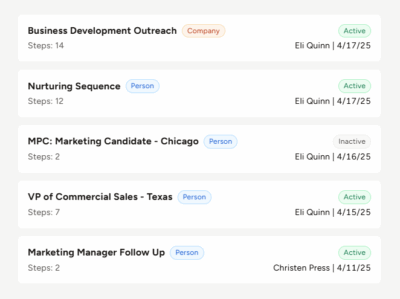In the recruiting profession, success hinges not only on talent acquisition, but also on fostering enduring partnerships. As a result, the art of follow-up stands as a linchpin for sustainable growth and success. Agency recruiters and search consultants operate within a competitive landscape where strengthening relationships is a form of currency. Consequently, the ability to nurture connections over time can make all the difference in achieving business objectives.
In this blog post, we will examine power of follow-up, exploring how consistent engagement can strengthen relationships, bolster client loyalty, and drive long-term success in the recruitment profession.
Understanding the Significance of Follow-Up
Follow-up is more than just a courteous gesture. It’s a strategic imperative in the realm of recruitment.
At its core, follow-up entails reaching out to candidates, clients, and industry contacts after an initial interaction to maintain engagement, provide updates, and strengthening relationships. Whether it’s a brief thank-you email, a personalized LinkedIn message, or a scheduled follow-up call, these touchpoints serve as building blocks for trust and rapport.
The significance of follow-up extends beyond mere etiquette. It’s a proactive approach to strengthening relationships that cultivates goodwill, fosters loyalty, and sets the stage for fruitful collaborations.
By staying top-of-mind and demonstrating genuine interest in the needs and aspirations of clients and candidates alike, recruiters can differentiate themselves in a crowded market and position themselves as trusted advisors rather than transactional service providers.
The Evolution of Follow-Up in Recruitment
In an era defined by digital connectivity and instant communication, the landscape of follow-up in recruitment has undergone a profound evolution. Traditional methods such as phone calls and handwritten notes have been complemented, and in some cases supplanted, by a diverse array of digital tools and platforms that facilitate seamless engagement across multiple channels.
Email remains a cornerstone of follow-up strategies, offering recruiters a convenient and scalable means of staying in touch with clients and candidates. Personalized email sequences, automated drip campaigns, and targeted newsletters enable recruiters to deliver timely and relevant content to their contacts, nurturing relationships and driving engagement over time.
Social media platforms like LinkedIn have also emerged as invaluable tools for follow-up in recruitment. By connecting with clients and candidates on professional networks, recruiters can extend their reach, share industry insights, and initiate meaningful conversations that transcend traditional boundaries.
Leveraging the power of social selling, recruiters can position themselves as thought leaders and trusted advisors within their respective niches, strengthening relationships that endure beyond individual placements.
Strengthening Relationships with Effective Follow-Up
The benefits of effective follow-up in recruitment are manifold, extending across every stage of the client and candidate journey. From initial outreach to post-placement support, consistent engagement demonstrates commitment, builds credibility, and reinforces the value proposition of the recruiter-client relationship.
For clients, proactive follow-up instills confidence in the recruiter’s ability to deliver results and demonstrates a genuine investment in their success. By providing regular updates on candidate progress, soliciting feedback, and offering strategic guidance, recruiters can position themselves as strategic partners rather than mere service providers, earning trust and loyalty in the process.
For candidates, follow-up represents a tangible demonstration of the recruiter’s commitment to their career advancement and personal fulfillment. By providing constructive feedback, facilitating interview preparation, and offering ongoing support throughout the hiring process, recruiters can create a positive candidate experience that enhances their reputation and strengthens their network of talent.
Strategies for Effective Follow-Up
Effective follow-up in recruitment requires a strategic approach that balances persistence with professionalism, persistence with sensitivity, and automation with personalization. By incorporating the following strategies into their follow-up efforts, agency recruiters and search consultants can maximize their impact and drive meaningful outcomes for their clients and candidates:
Establish Clear Objectives
Before initiating follow-up activities, clarify your objectives and desired outcomes.
Whether it’s securing a commitment from a client, obtaining feedback from a candidate, or nurturing a long-term relationship, having a clear goal in mind will guide your approach and ensure that your follow-up efforts are purposeful and results-oriented.
Customize Communication
Tailor your follow-up messages to the preferences and priorities of your recipients.
Personalization is key to building rapport and demonstrating genuine interest in the individual needs and aspirations of clients and candidates. Reference specific conversations, highlight mutual interests, and incorporate relevant details to make your communication feel personalized and relevant.
Use a Multichannel Approach
Embrace a multichannel approach to follow-up that leverages a diverse array of communication channels and touchpoints.
Combine email, phone calls, social media, and in-person meetings to engage with clients and candidates across different platforms and contexts. By diversifying your outreach efforts, you increase the likelihood of reaching your audience and fostering meaningful interactions.
Be Timely and Consistent
Timing is critical in follow-up, particularly in a fast-paced industry like recruitment where opportunities can arise and disappear in an instant.
Be proactive in your communication, following up promptly after meetings, interviews, and other interactions to keep momentum alive and demonstrate your commitment to progress. Consistency is equally important; establish a regular cadence of follow-up to maintain engagement and strengthening relationships over time.
Provide Value
Offer tangible value in your follow-up communications by providing relevant insights, resources, and opportunities that resonate with the interests and objectives of your audience.
Share industry news, market trends, and career development tips that demonstrate your expertise and add value to your clients and candidates. By positioning yourself as a trusted source of information and advice, you strengthen your relationships and differentiate yourself from competitors.
Seek Feedback and Act on It
Solicit feedback from clients and candidates on your follow-up approach and be receptive to their input.
Ask for suggestions on how you can improve your communication style, responsiveness, and overall service delivery. Incorporate feedback into your follow-up strategy and use it to refine your approach, ensuring that your interactions are always aligned with the needs and preferences of your audience.
Strengthening Relationships By Leveraging Technology
Technology plays a pivotal role in modern follow-up strategies, enabling recruiters to streamline communication, automate repetitive tasks, and scale their outreach efforts effectively. By leveraging the right tools and platforms, agency recruiters and search consultants can optimize their follow-up processes and deliver a seamless experience to clients and candidates alike.
Customer relationship management (CRM) systems are indispensable tools for managing follow-up activities and maintaining a centralized database of client and candidate interactions.
Recruitment CRM software enables recruiters to track communication history, set reminders for follow-up tasks, and segment contacts based on various criteria such as industry, location, and job function. By harnessing the power of CRM, recruiters can stay organized, prioritize follow-up activities, and ensure that no opportunity falls through the cracks.
Email marketing platforms offer robust features for creating and managing follow-up campaigns, allowing recruiters to design personalized email sequences, track engagement metrics, and automate follow-up tasks based on predefined triggers. Advanced automation capabilities such as drip campaigns, lead scoring, and dynamic content personalization enable recruiters to deliver targeted messaging at scale, strengthening relationships and driving conversions over time.
Social media management tools empower recruiters to monitor conversations, engage with followers, and share relevant content across multiple social platforms. By scheduling posts, tracking engagement metrics, and analyzing audience demographics, recruiters can optimize their social media presence and amplify their reach, driving awareness and engagement among clients, candidates, and industry influencers.
Overcoming Common Challenges in Follow-Up
Despite its undeniable importance, follow-up in recruitment is not without its challenges. From managing a high volume of contacts to navigating diverse communication preferences, recruiters must contend with various obstacles that can impede their follow-up efforts.
By recognizing these challenges and implementing strategies to address them proactively, recruiters can overcome barriers to effective follow-up and drive meaningful outcomes for their clients and candidates.
Time Constraints
Recruiters often face time constraints that limit their ability to follow up consistently and comprehensively.
Juggling multiple clients, candidates, and projects can make it challenging to prioritize follow-up activities and allocate sufficient time and resources to each interaction. To overcome this challenge, establish a structured follow-up process that incorporates automation, delegation, and time management techniques to streamline your workflow and maximize efficiency.
Communication Overload
In an era of information overload, clients and candidates are inundated with messages from recruiters vying for their attention.
Cutting through the noise and capturing the interest of your audience requires strategic communication that is relevant, personalized, and value-driven. Focus on quality over quantity in your follow-up efforts, delivering concise, targeted messages that resonate with the needs and priorities of your recipients.
Managing Expectations
Effective follow-up requires managing expectations and setting realistic timelines for action and response.
Clients and candidates may have differing expectations regarding the frequency and format of follow-up communication, leading to misunderstandings and frustration. Take the time to establish clear communication protocols and expectations upfront, ensuring that both parties are aligned on the cadence, content, and objectives of follow-up interactions.
Maintaining Consistency
Consistency is key to successful follow-up, yet maintaining a regular cadence of communication can be challenging in a fast-paced industry like recruitment.
To overcome this challenge, leverage technology to automate routine follow-up tasks and reminders, freeing up time for personalized interactions with high-priority contacts. Establish a follow-up schedule and stick to it religiously, treating follow-up as a non-negotiable component of your daily routine.
Adapting to Changing Preferences
Clients and candidates may have evolving preferences when it comes to communication channels and formats, necessitating flexibility and adaptability on the part of recruiters.
Stay attuned to shifting trends and preferences in communication, and be prepared to adjust your follow-up strategy accordingly. Experiment with different channels and approaches to determine what resonates most with your audience, and be open to feedback and suggestions for improvement.
Case Studies: Follow-Up for Strengthening Relationships
To illustrate the transformative power of follow-up in recruitment, let’s explore two real-life case studies that showcase how strategic engagement can strengthen relationships, drive client satisfaction, and unlock new opportunities for success.
Case Study 1: Building Client Loyalty through Consistent Engagement
Background: A boutique recruitment agency specializing in the technology sector was struggling to differentiate itself in a competitive market and secure repeat business from clients.
Challenge: The agency faced stiff competition from larger firms with greater resources and brand recognition, making it difficult to establish a foothold and build lasting relationships with clients.
Solution: Recognizing the importance of follow-up in fostering client loyalty, the agency implemented a comprehensive follow-up strategy that prioritized consistent engagement and personalized communication.
Outcome: By staying in touch with clients regularly, providing value-added insights, and soliciting feedback on their recruitment needs and preferences, the agency was able to deepen its relationships and earn the trust and loyalty of its clients. As a result, the agency saw an increase in repeat business, referrals, and positive testimonials, positioning it as a trusted partner and preferred provider of recruitment services in the technology sector.
Case Study 2: Nurturing Candidate Relationships for Long-Term Success
Background: A recruitment consultancy specializing in executive search was struggling to attract and retain top-tier candidates in a competitive talent market.
Challenge: The consultancy faced challenges in maintaining engagement with candidates throughout the recruitment process, leading to high dropout rates and missed placement opportunities.
Solution: To address this challenge, the consultancy revamped its follow-up process to prioritize candidate engagement and support at every stage of the hiring journey.
Outcome: By implementing proactive follow-up techniques such as regular check-ins, personalized updates, and post-placement support, the consultancy was able to nurture stronger relationships with candidates and increase retention rates. Candidates appreciated the consultancy’s attentiveness and support, leading to greater satisfaction and loyalty over time. As a result, the consultancy saw improvements in candidate quality, placement success, and client satisfaction, driving business growth and differentiation in the executive search market.
The Imperative of Follow-Up for Strengthening Relationships
In an industry where relationships are paramount and success hinges on trust, follow-up stands as a critical driver of long-term success and sustainability. Agency recruiters and search consultants who embrace the power of follow-up can differentiate themselves in a crowded market, deepen client loyalty, and unlock new opportunities for growth and innovation.
By adopting a strategic approach to follow-up that prioritizes consistency, personalization, and value delivery, recruiters can build lasting relationships that withstand the test of time and drive meaningful outcomes for their clients, candidates, and organizations alike.
The power of follow-up lies not only in its ability to nurture connections but also in its capacity to transform relationships into enduring partnerships that fuel success in the recruitment industry and beyond. As agency recruiters and search consultants navigate the complexities of the modern marketplace, they must recognize follow-up as a cornerstone of their business strategy and invest in cultivating meaningful engagements that drive value, foster loyalty, and propel growth in the ever-evolving world of recruitment.









